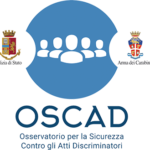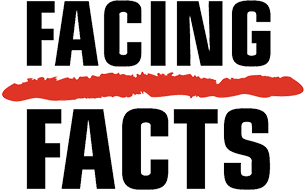Facing Facts: Italy’s experience


In this blog, Lucia Gori, Hate Crime trainer and Officer of the Italian National Police, tells us about her team’s experience of working with Facing Facts to develop a national online learning programme for the Italian Police, and to research the strengths and weaknesses of Italy’s hate crime reporting and recording system.
(edited by Joanna Perry)
About OSCAD
The Observatory for Security Against Acts of Discrimination (OSCAD) was established in late 2010. It is a multi-agency body within the Ministry of Interior, in the Department of Public Security and the Central Directorate of Criminal Police. Its purpose is to improve the ability of Italian Police agencies (in particular National Police –“Polizia di Stato” and Carabinieri Corps – “Arma dei Carabinieri”) to prevent and combat hate crimes. For OSCAD, training is a priority because we believe that it is key to achieving our mission. Law enforcement personnel are the first and most sensitive front office for persons belonging to ‘minority groups’. It is absolutely essential to raise officers’ awareness, improve their training and, above all, clearly send the message that respect for human rights, along with prevention and fight against hate crimes, are strategic priorities for the Country.
Uniformed law enforcement personnel are the most “visible business card” of the country.
An error committed by law enforcement with regard to victims or communities can reinforce the “message” sent by the perpetrators of non-acceptance, of hate, of prejudice. The confidence of victims and the victim’s community can disappear…maybe forever.
Since our first training activity we understood that a police-only approach cannot be fruitful so we decided to include testimonials and a more active role of civil society organisations and other relevant institutions in the delivery of the trainings. We involve the Italian equality body, UNAR and Amnesty International. We are very proud to say that, thanks to OSCAD, Amnesty International entered into the Police schools for the very first time. We also involve several Italian NGOs who have turned out to be an important asset of OSCAD’s training. In particular we have cooperated closely with “COSPE” an NGO specialized in promoting intercultural dialogue and fighting discrimination– in particular racial discrimination– and Rete Lenford, a network of lawyers specialised in LGBTI rights. Their cooperation is crucial since Italy’s national hate crime legislation doesn’t cover the grounds of sexual orientation and gender identity. Despite the lack of legislation, we deliver joint training activities with LGBTIQ+ NGOs, which include a specific focus on anti-LGBT bias indicators. We also suggest practical and community-focused solutions to our colleagues, and this effort is supported by our cooperation with LGBTI associations.
So far, we have trained 34,000 police officers, partly in person and partly on line.
Joining the Facing all the Facts Project
In 2016 CEJI invited OSCAD to be a partner in the Facing all the Facts project (FATF). It was the first time that we took on a partner role in an EU funded project and we were worried about whether we could cope with the demands on our time and resources. We are a small office, and our competence is completely outside of the management of European projects. At the same time, we understood that we couldn’t miss this opportunity.
Being on board of this project would have meant to have material developed into Italian and tailored for our country needs, so we decided to say yes!
From 2016 to 2019, OSCAD was partner of the FATF project.
As a result, we co-led:
- the first research on hate crime data recording/collection in Italy, which aimed to discover what works and to identify gaps and opportunities to improve cooperation and data sharing between criminal justice systems and CSOs;
- a comprehensive online training course divided in three modules for improving the operational capacity of law enforcement in preventing and responding to hate crime.
In addition, 4 out of the 7 bias indicators courses developed with the FATF project were translated into Italian.
Now, police officers, authorities, stakeholders, NGOs and every person who wants to find out about the Italian situation concerning hate crime recording and data collection can explore the Facing Facts site, find the research and read “The story of hate crime recording and data collection”, the timeline with some of the most relevant milestones for the country, relating to, events that changed the country’s perspective, fundamental legislative implementation and other useful information.
Our potential interested user can find also an easy-to-read picture of “the journey of a hate crime case” that can help to understand how many difficult moments has to face a victim of a hate crime and how many times a lack of network between different stakeholders can represent a sort of “dark hole” in which the victims can fall through.
The ‘linear’ criminal justice process presented in the Journey picture is also represented in a second graphic representation. “The System map” in English and Italian, depicts the connections and relationships between the different Italian stakeholders . Connections are represented with a different color depending on the level of cooperation (very good – green, medium-amber and poor- red). The system and the innovative methodology that led to its creation helps to understand which relationship are good, which should be improved and the effort that the country should do to fill in the existing gaps in connection.
I used the words “picture, graphic representation”…but behind these simple words there are several meetings, interviews with “change agents” round tables in which, for the very first time we were able to bring together different stakeholders.
All these resources, all the information gathered, all this human value gave us a real insight of the country.
It was a “deep needs and gap assessment”, deeper than OSCAD had ever carried out before. In the framework of the FATF project we conducted – for the first time – a proper training needs assessment for our online courses.
The encounter between CEJI’s expertise and methodologies and OSCAD previous experience, made it possible to develop a significant number of learning tools produced with different learning methodologies, which are a real treasure for a good trainer.
Indeed every good trainer knows that having in its portfolio different learning tools gives the possibility to meet the needs of different learners. Some have a more verbal approach, others prefer the visual approach, others the “learning by doing approach”.
Our “piece of gold” it is the “online course” on hate crime for Italian law enforcement with these main features:
- different learning methodologies: slides, footage of real cases, quizzes, interactive lessons, infographics, interviews with NGOs representatives and investigators, case studies covering different grounds of prejudice (from racial prejudice to LGBTI, to prejudice against religious minorities), additional material such as legislation, court rulings, useful links to others resources, guides, brochures;
- development in cooperation with NGOs;
- practical and operational approach.
The course, initially available on the CEJI e-learning platform, was migrated to the Italian law enforcement e-learning platform. It is now available for all law enforcement agencies at national and local level.
The strong motivation of our team and CEJI support made the difference and was key to navigate the administrative and technical challenges in order to have the course widely accessible by the Italian police forces.
Indeed, the on-line course this year will constitute a compulsory training day for national police officers.
All the material will be available also for trainers that now have the possibility to blend their already existing tools with all this material, choosing what to use or which part of the course can be useful depending from the type of learners they will have.
The online course opens with a video message from the former Chief of police, providing a clear endorsement by a high level authority that is an important message for learners.
The course is composed of three modules:
- What is a hate crime: offering basic information related to the peculiarities of hate crimes and covering basic concepts such as under-reporting, under-recording, multi-effect at different level, escalation.
- Bias indicators: including an analyses of different bias indicators for specific grounds of discrimination. The module presents interviews and real case-studies that can help to recognize what are bias indicators and how important it is for a police officer to be able to transpose bias indicators into police reports, to unmask bias motivation throughout proper investigations, and allowing prosecutors and judges to be more aware of the real motivation of the committed crime.
- How to relate with victims and communities: this is the most practical module offering several interviews with investigators who, sharing their experience on the ground, offer advice to their colleagues, taking a “peer-to-peer approach”.
Cooperation with NGOs has been crucial, giving us their point of view from a different perspective, and allowing police officers to make a sort of “walk in my shoes exercise”, increasing their awareness and boosting their sensitivity towards victim needs.
My conclusions from this experience
‘Pros’, or what worked well:
- CEJI/FATF competence and support: this made the difference!
- The support of our hierarchy in the Ministry of Interior was crucial
- Cooperation with NGOs towards a common goal: without them the training would have lost half of its effectiveness
- High quality training material: this was our piece of gold!
- New opportunities for blended learning offered more opportunity for Italian trainers
- EU funding was fundamental for our institution.
‘Cons’, or what didn’t work so well:
- The project took considerable effort for our small office
- Linguistic barriers: at some points, communication was difficult, but having an Italian person at CEJI made the difference. Thanks so much to Melissa for her support
- The budget report for the Commission, was quite a nightmare, but CEJI was there to help!
- Difficulties in implementing research recommendations on data recording & collection. Although the project is finished, and the goals are all achieved, we should see this as a starting point for Italy to put in place lessons learned and to correctly use all of the research findings.
A really big thanks to all CEJI staff and the Facing Facts team!


 Facing Facts is co-funded by the Citizens, Equality, Rights and Values Programme
Facing Facts is co-funded by the Citizens, Equality, Rights and Values Programme
Leave a Reply